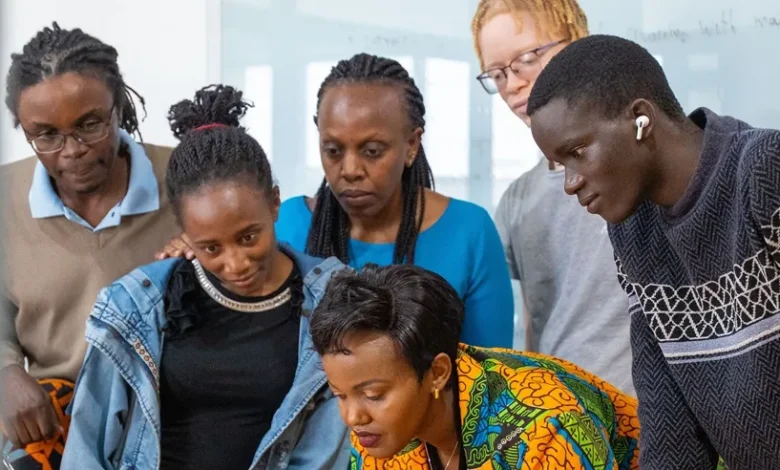
Kenyan startup Qhala is helping governments, corporates, and NGOs across Africa embrace digital transformation by leveraging data-driven strategies and emerging technologies such as artificial intelligence (AI), cloud computing, and blockchain.
The company was founded in early 2020 by Dr. Shikoh Gitau, a computer scientist and former head of innovation at Safaricom.
It was born out of a simple idea in a Nairobi coffee shop in what the founder thought of harnesing technology to improve millions of lives across the continent.
The company emerged in response to a critical gap in skills and capacity around digital transformation.
“Many organisations lacked the right talent and strategies to digitise effectively. Off-the-shelf solutions often ignore local context or are deployed without sufficient data and research. Qhala bridges that gap by providing bespoke, research-based digital transformation services rather than generic tech products,” Gitau explained in an interview with Disrupt Africa.
Since its launch, Qhala has rolled out a number of initiatives, including QLab, Qubit Hub, and Q Trust, all geared toward accelerating digital adoption. Among its most notable contributions was leading the development of Kenya’s COVID-19 modelling platform, in partnership with the Ministry of Health and the University of Nairobi, which informed government decision-making during the pandemic. The firm has also spearheaded programmes such as iHelix, a corporate–startup collaboration platform, and has been instrumental in designing AI literacy and policy initiatives across Africa.
Qhala is entirely self-funded, drawing revenue from projects and consulting engagements. Its partners include the Gates Foundation, Huawei, Microsoft, Amazon Web Services, Afri-EximBank, AfTCA, Britam, and Caribou Digital.
Also Read: Somalia leaps towards digital transformation through QR-based payments brought by BPC
“The COVID dashboard was a gamechanger, showing policymakers how data-driven tools can support crisis management. It validated our approach very early on,” Gitau said. “Similarly, our iHelix programme has been embraced by corporates such as Safaricom, Kenya Airways, Stanbic Zambia, AAR, Britam, and Nation Media Group.”
Though headquartered in Kenya, Qhala’s footprint extends across Rwanda, Nigeria, Cameroon, Uganda, South Africa, Zambia, Malawi, Botswana, as well as the UK and US. Its services range from custom digital transformation consulting and innovation management to hackathons, policy workshops, training programmes, and platform development.
Gitau reflects that launching Qhala at the onset of the COVID-19 pandemic was both a challenge and an opportunity.
“The crisis underscored the urgency of digital transformation, but it also revealed just how unprepared many institutions were, from inadequate infrastructure to slow policy environments,” she said.
Perhaps the biggest hurdle, Gitau notes, has been building trust in a new kind of consultancy—one that does more than deliver technology tools. “We had to show clients the value of shaping national-level strategy and policy using data and innovation. It required patience, experimentation, and grounding in local realities.”
Today, Qhala stands as a leading force in Africa’s digital transformation journey, blending innovation, strategy, and contextual understanding to create solutions that go beyond technology—reshaping how organisations think, operate, and deliver impact.






Istanbul city tour Very easy to join and enjoy the tour. https://planningdubai.ae/?p=12958
Wonderful post however I was wanting to know if you could write a litte more on this subject? I’d be very grateful if you could elaborate a little bit further. Bless you!
Hello my loved one! I want to say that this article is awesome, nice written and include approximately all important infos. I would like to see more posts like this.
**mindvault**
mindvault is a premium cognitive support formula created for adults 45+. It’s thoughtfully designed to help maintain clear thinking
Glad to be one of many visitants on this amazing site : D.
hello!,I like your writing so so much! percentage we keep in touch more about your post on AOL? I require an expert in this area to solve my problem. May be that’s you! Looking forward to look you.
Hello very nice web site!! Man .. Excellent .. Amazing .. I’ll bookmark your site and take the feeds additionallyKI am glad to search out so many useful information right here within the put up, we want develop extra strategies on this regard, thanks for sharing. . . . . .
Wow, fantastic blog layout! How long have you been blogging for? you made blogging look easy. The overall look of your web site is great, as well as the content!
I do agree with all the ideas you have presented in your post. They’re really convincing and will definitely work. Still, the posts are very short for novices. Could you please extend them a little from next time? Thanks for the post.